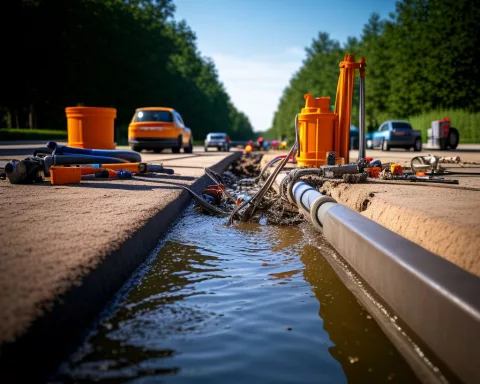Cape Town has introduced a cutting-edge Pump Station Control Room that digitally monitors the real-time performance of the city’s water and sanitation systems. This innovation has revolutionized the city’s approach to infrastructure complications, providing swift deployment of repair teams and reducing false alarm response times by up to half. The initiative is part of a comprehensive approach to improving infrastructure, reducing environmental impact, and benefiting the community, with 75% of the infrastructure investment designated to assist lower-income households and communities. Cape Town is paving the way for other cities in utilizing digital technology to enhance urban infrastructure and improve the quality of life for residents.
Revolutionizing Infrastructure Monitoring
Cape Town’s latest digital innovation, the Pump Station Control Room, enables real-time monitoring of water and sanitation systems, transforming the city’s approach to infrastructure complications. The system reduces false alarm response times by up to half and enables swift deployment of repair teams. The city’s strategic initiatives also include resource allocation for rapid response teams, investment in generators and UPS, and annual sewer pipe replacements and jet-cleaning to alleviate blockages and overflows. The project, including 75% infrastructure investment for lower-income households and communities, underscores Cape Town’s dedication to all-inclusive growth and development through digital transformation in urban development.
In the digital age that we currently reside in, digital technology has become a critical element in all aspects of our lives. In alignment with this transition, the city of Cape Town has introduced their latest digital innovation, the Pump Station Control Room. Officially opened by Cape Town Mayor Geordin Hill-Lewis, this cutting-edge control center boasts the ability to digitally monitor the real-time performance of water and sanitation systems.
Revolutionizing Infrastructure Monitoring
A tour of the newly established control room revealed an advanced digital system that facilitates real-time tracking of the city’s water and sewage systems. This innovative tracking mechanism has completely transformed the city’s approach to dealing with infrastructure complications, providing swift deployment of repair teams and slashing false alarm response times by up to half since the first few months of its operation. This enhanced operational competency directly benefits the communities through quicker response times and lessened effects of sewage and water overflows.
This control center does not operate independently, but is a component of a wider collection of initiatives meant to minimize the effects of sewage leaks on both communities and the environment. These strategic initiatives encompass resource allocation for rapid response teams and fleets, investment in generators and Uninterruptible Power Supplies (UPS) to counteract network power failures, and a vigorous campaign of annual sewer pipe replacements and sewer jet-cleaning to alleviate blockages and overflows.
Investment in Infrastructure and Development
One of the key elements of this project is the unprecedented infrastructure investment, of which 75% is designated to directly assist lower-income households and communities. This reinforces the city’s dedication to all-inclusive growth and development.
From a financial perspective, the city is dedicated to investing a staggering R5.3 billion in water and sewage infrastructure for the 2024/25 financial year, more than twice their inaugural budget of the current local government tenure. Over the following three years, the city is planning to invest a sum of R16.5 billion into water and sewage infrastructure, a hefty 41% of Cape Town’s medium-term capital budget, which includes R1 billion allocated for upgrades to sewage pump stations, emphasizing the government’s commitment to maintaining the sustainability and efficiency of their infrastructure.
Embracing Digital Transformation to Improve Quality of Life
The inauguration of the Pump Station Control Room, along with the set of strategic initiatives, underscores Cape Town’s dedication to utilizing digital technology to monitor, preserve, and enhance the city’s infrastructure. However, this initiative is not solely about increased efficiency; it’s also about improving the quality of life for its residents, particularly those from lower-income households.
With this initiative, Cape Town is paving the way for other cities, underscoring the influence of digital technology in enhancing urban infrastructure, response times, and ultimately, the living conditions of its residents. As we continue to advance into the digital era, it’s heartening to see cities like Cape Town leading the charge in incorporating digital technology into infrastructure management. The Pump Station Control Room is indeed a shining example of digital transformation in urban development.
The Bigger Picture of Urban Development
While the Pump Station Control Room is a commendable achievement on its own, it’s just a single piece of a larger puzzle. The complete picture encompasses numerous initiatives and substantial investments aimed at improving infrastructure, reducing the environmental footprint, and benefiting the community, with an emphasis on lower-income households. Through this comprehensive approach, Cape Town is not only highlighting its commitment to its residents but also setting a credible example for other global cities.
What is the Pump Station Control Room in Cape Town?
The Pump Station Control Room is a cutting-edge digital control center in Cape Town that enables real-time monitoring of the city’s water and sanitation systems, transforming the approach to dealing with infrastructure complications.
What are the benefits of the Pump Station Control Room?
The Pump Station Control Room reduces false alarm response times by up to half and enables swift deployment of repair teams, directly benefiting the communities through quicker response times and lessened effects of sewage and water overflows.
What other strategic initiatives does Cape Town have in place for infrastructure management?
Cape Town has strategic initiatives that encompass resource allocation for rapid response teams and fleets, investment in generators and Uninterruptible Power Supplies (UPS) to counteract network power failures, and a vigorous campaign of annual sewer pipe replacements and sewer jet-cleaning to alleviate blockages and overflows.
What is the infrastructure investment in Cape Town?
Cape Town has unprecedented infrastructure investment of which 75% is designated to assist lower-income households and communities. The city is dedicating a staggering R5.3 billion in water and sewage infrastructure for the 2024/25 financial year and R16.5 billion over the following three years.
What is the goal of Cape Town’s digital transformation in urban development?
Cape Town is embracing digital transformation to monitor, preserve, and enhance the city’s infrastructure, improving the quality of life for its residents, particularly those from lower-income households. The initiative sets an example for other global cities to incorporate digital technology into infrastructure management.
What is the bigger picture of Cape Town’s urban development?
The complete picture of Cape Town’s urban development encompasses numerous initiatives and substantial investments aimed at improving infrastructure, reducing the environmental footprint, and benefiting the community, with an emphasis on lower-income households. The city highlights its commitment to its residents and sets a credible example for other global cities.












